Tony Abbott, the accidental PM
Tony Abbott says he never wanted the top job until Malcolm Turnbull faltered on climate change.
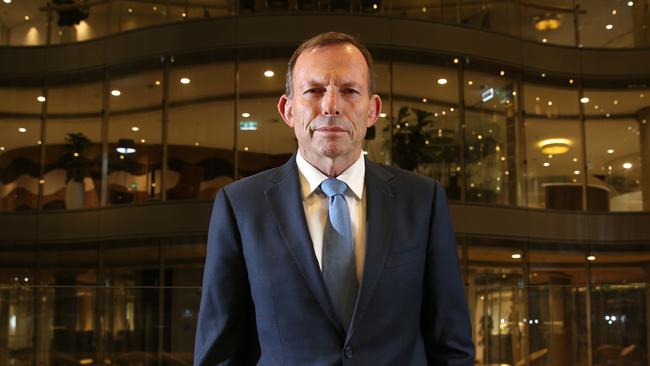
Tony Abbott is one of only four Liberal leaders to take the party from opposition into government. It is a rare achievement and one only joined by Robert Menzies, Malcolm Fraser and John Howard over the past 75 years. He is the fourth-longest-serving leader of the party (2009-15) but one of its shortest-serving prime ministers (2013-15).
Liberal Party 75th Anniversary: ‘Turnbull’s ambition was my undoing’ | Praise the Libs for progress: Howard | The centre-right’s date with destiny
Yet Abbott did not seek the leadership, or the prime ministership, to fulfil an ambition harboured from a young age. He once said he had too many unpopular ideas on too many unfashionable issues. The top job, he insists, was not on his radar until Malcolm Turnbull’s leadership faltered over climate change in late 2009.
“I was the accidental leader,” Abbott tells The Australian in his first lengthy post-election interview to mark the Liberal Party’s 75th anniversary. “I’d resigned from the shadow cabinet along with a whole lot of other people including Nick Minchin because I’d come to the view that Malcolm was politically crazy to try to get us to back Labor’s emissions trading scheme.”
Abbott thought Turnbull’s leadership was “terminal” and Joe Hockey was “the obvious candidate” to succeed him. But when Hockey equivocated over whether or not to support the Rudd government’s emissions trading scheme, and promised MPs a conscience vote on the issue, Abbott saw an opportunity.
“Well, someone’s got to run who is going to take a strong position opposing Labor’s great big new tax on everything,” he thought. In the three-way ballot, Hockey was eliminated and Abbott defeated Turnbull by 42 votes to 41. It was the narrowest of margins. “So, I was the accidental leader,” Abbott says.
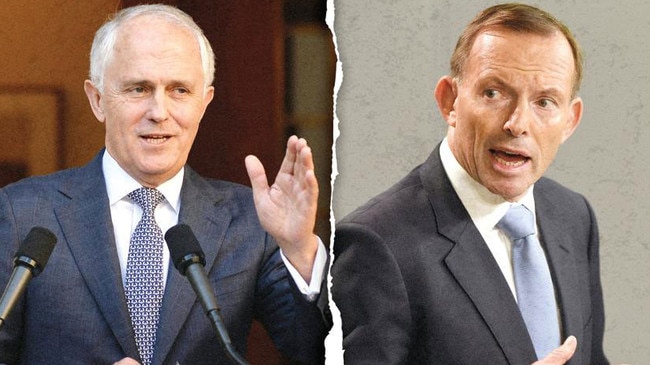
Abbott was not always a blue-blood Liberal. In mid-1987, he wrote to his mentor, BA Santamaria, expressing doubts about whether to join the Liberals or Labor. He seemed more suited to the defunct Democratic Labour Party. Indeed, in his obituary for Santamaria, written for The Daily Telegraph in February 1998, Abbott wrote that “the DLP is alive and well living inside the Howard government”.
He says he may have been entertaining Santamaria’s doubts about both major parties but insists he had “well and truly opted for the Liberal side” of politics by then. Yet he voted Labor at the 1988 NSW state election. “Every human being is on a journey,” Abbott says, “and you cannot tell where anyone’s journey is going to take them.”
It was quite a journey. Abbott studied at Oxford on a Rhodes scholarship, trained as a priest, worked as a journalist, was press secretary to John Hewson and executive director of Australians for a Constitutional Monarchy. In March 1994, Abbott won the seat of Warringah in a by-election. He served as a minister in the Howard government and as a shadow minister in opposition.
Having been in power federally for almost two-thirds of its existence, Abbott says the Liberal Party can reasonably claim to be Australia’s natural party of government. “No party can represent the country as wholeheartedly as we can,” he says. “First, because no particular section owns us the way the unions own the Labor Party. And, second, because we have not succumbed to the siren song of globalism to anything like the extent that the political left has.”
Abbott accepts there have been errors of judgment. “You could say that Menzies’s communist party referendum was a mistake, you could say that maybe the Howard government in its last year or so overestimated the impact of terms of trade changes on the long-term fiscal situation (and) you could say that the Fraser government kept too much of the Whitlam settlement,” he says.
“I’m sure lots of people could find fault with my government and it would be impolitic of me to find fault with either the Turnbull government or the Morrison government, but, look, you could always say that some things could have been done better. But I think in our determination not to overtax and overregulate people, to respect tradition and to put Australia first, we have done our country proud.”
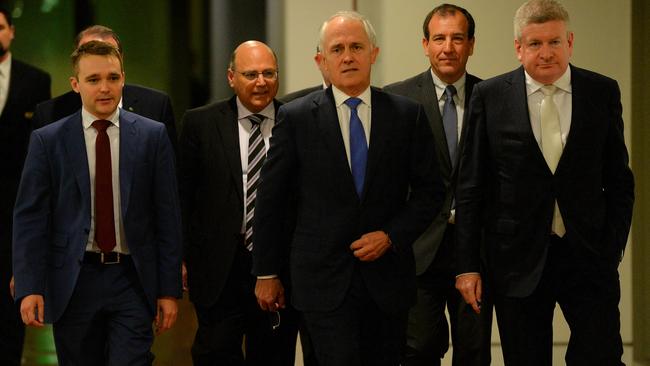
Most former leaders have identified liberal and conservative strands of thinking in the party and have tended to personally identify with one or the other. But Abbott identifies a third strand: patriotism. “There are three broad strands of the Liberal Party’s political position,” he explains. “There’s the liberal strand, there’s the conservative strand and, above all else, there’s the patriotic strand. I mean, yes, we are the freedom party, yes we are the tradition party but above all else we are the patriotic party.”
He posits that differences within the party have tended to be based more on personality than philosophy. Moreover, Abbott says “a political party that gets hung up on philosophical questions is an inward-looking party” and that one of the keys to the Liberal Party’s success is “pragmatism” in the pursuit of power.
“What we always need to do is to ask ourselves, what are the issues that are troubling people at this time and come up with feasible, understandable ways forward,” he suggests. “We certainly looked the more practical and the less ideological of the two parties at the last election, and that’s why we won.”
The Liberal Party, like Labor, has suffered a long-term fall in membership. Abbott would like the membership to grow and be more representative of the electorate. He would also like to see candidates with more life experience contesting seats for the party.
“This is why I’ve been a big fan of democratisation of the NSW Liberal Party,” he explains. “The essential function of a political party is to put good people into parliament and to try and ensure that it is an effective sounding board for those people once they are there.”
Abbott names Robert Menzies and John Howard as the Liberal Party’s most important and influential leaders. All leaders have a prime duty, Abbott says, to articulate and advocate the party’s enduring values.
“We have our own version of the apostolic succession,” Abbott says. “It’s the job of each leader of the party to keep the faith and to pass on the corpus from one to the other so that it is recognisably the same over time and that what the Liberal Party is today and tomorrow is recognisably faithful to what the Liberal Party was yesterday.”
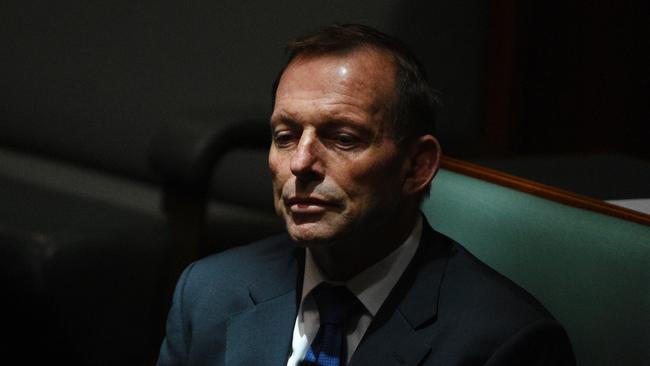
He was “a great enthusiast” for Malcolm Fraser’s government in its early days but felt “a sense of disappointment” by the end. But he now thinks the Fraser government will come to be “better regarded” by Liberals than it was in the 1980s and 90s. It is a generous assessment. He sought out Fraser when he became Liberal leader in December 2009 and tried to talk him out of resigning from the party.
Abbott’s prime ministership was a mix of considerable achievements and avoidable blunders. On the positive side of the ledger, he identifies: beginning the task of fiscal repair; implementing a tough border protection regime; repealing the carbon and mining taxes; finalising free-trade agreements; prioritising counter-terrorism and defence planning; and investing in new infrastructure.
Yet there were plenty of mistakes and misjudgments. His government probably never recovered from the 2014-15 budget, which was seen as a breach of faith with voters for breaking promises. The government struggled to define itself and articulate its agenda. Day-to-day political management was often shambolic. Abbott told me in mid-2016 that he had been regarded as “a divisive figure” among some voters.
“There is absolutely no doubt that there were a couple of things that I did, particularly the restoration of knighthoods (and damehoods), which caused me a lot of grief,” he concedes.
But, ever defiant, Abbott thinks they should be reintroduced. “If we are going to have an honours system (then) I think that at the apex of the system we should have knights and dames.”
Julie Bishop was deputy leader when Abbott took over the reins from Turnbull. Abbott thinks their relationship was good, until she supported Turnbull returning to the leadership. “I thought it was fine while it existed but plainly that’s not how she thought of it,” he says, with a laugh.
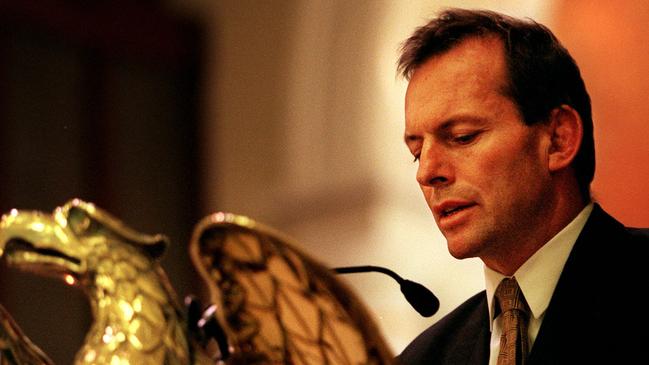
Then there was his relationship with National Party leader Warren Truss. “Warren was just about the most honourable man in politics,” Abbott says. “If he had a problem he would tell you plainly what it was, he would listen carefully to your response and together you would always come to a reasonable solution.”
Abbott bristles a little when the untimely manner of his demise is mentioned. “We got a lot done in two years but, look, my problem was that I had one colleague who was never happy to be someone else’s minister.” He is, of course, referring to Turnbull.
“It wasn’t that we had a divided government, it was more that there was one person who was determined to get to the top by hook or by crook. Malcolm always thought it was his destiny to be prime minister and I happened to be the obstacle to that, and so he dealt with me as best he could.”
Turnbull challenged and defeated Abbott for the leadership in September 2015, winning by 54 votes to 44. Abbott says he has come to terms with the result and has “mostly” forgiven those who turned against him. “It is what it is, and there is no point going through life with lasting enmities,” he says.
Turnbull’s supporters say his prime ministership was constantly undermined by Abbott. When I asked Abbott earlier this year if he was “a party wrecker”, he was quick to dismiss it. “I put Malcolm Turnbull on my frontbench in opposition,” he said. “I kept him in my cabinet in government. I note that Malcolm never returned the compliment when he had a chance to do so.”
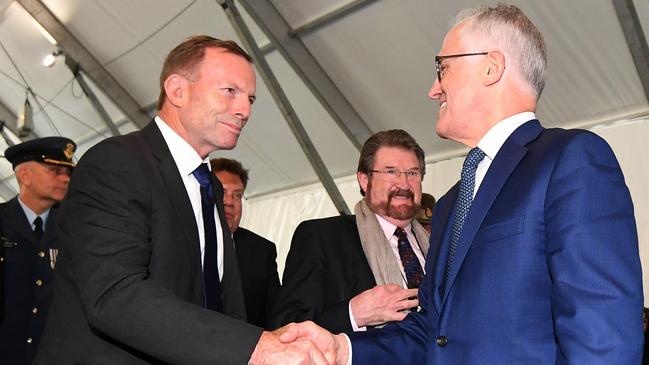
He added: “I have never given to a journalist information about someone else which is designed to damage another person. From time to time I might have offered a critical judgment on individual policies, maybe on occasion even individuals, but I’ve always acted in accordance with what I think the rules of politics should be.”
Abbott was returned in the seat of Warringah in July 2016 but was defeated by independent Zali Steggall at the election in May this year. He had held the seat for 25 years.
On election night, as Abbott looked out to a sea of supporters clad in Liberal blue, he said he knew it would be difficult to win but was not going to run from a fight. “I can’t say that it doesn’t hurt to lose. (But) I’d rather be a loser than a quitter.”
A gala tribute dinner will be held next month to honour Abbott’s political career. He still has significant support among conservatives at home and is a respected contributor to political debates abroad. (He was invited to the Conservative Party conference in Manchester last week.)
At 61, Abbott says he is fitter than he was 25 years ago. He is not done with politics. He sees a role for himself as a conservative standard bearer at home and abroad. His chief regret as prime minister? “I wish I’d had longer,” he says. So it begs the question: would Abbott like to return to parliament? He does not dismiss the idea.
“If the Liberal Party ever wanted me to do that I would be more than happy to consider it, but I find it difficult to imagine the circumstances that they would want me,” Abbott says. “I’m not ruling it out but I’m certainly not expecting it to happen.”
Tomorrow, Part 3: Malcolm Turnbull on leadership, achievements and regrets


To join the conversation, please log in. Don't have an account? Register
Join the conversation, you are commenting as Logout